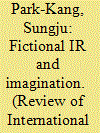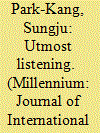| Srl | Item |
| 1 |
ID:
139582


|
|
|
|
|
| Summary/Abstract |
In the field of International Relations (IR), narrative approaches and an alternative way of writing seem to have gained growing attention in recent scholarship. Autoethnography and autobiography can be taken as primary examples. The article aims to advance this growing scholarship by proposing the concept of fictional IR. The idea is concerned with how to use the imagination in IR. I suggest that fiction writing can become a method for dealing with lack of information and contingency surrounding it. Fictional IR is more than reading and using fiction as a reference source or vehicle for analysis. It can incorporate the employment of fiction writing in IR scholarship. One of the benefits could be to articulate sensitive and complicated problems in a more flexible and imaginative way, making the most of the power of story and imagination. It should be stressed that the focal point is to write fiction; it is not to write about fiction. To support this suggestion, the article offers a short fictional-factual story. By using imagination, creating characters, combining data with fictional narrative, or with one's own experience, I believe that more original and empathetic IR writing is possible.
|
|
|
|
|
|
|
|
|
|
|
|
|
|
|
|
| 2 |
ID:
105938


|
|
|
|
|
| Publication |
2011.
|
| Summary/Abstract |
This article attempts to problematise the conventional notion of dialogue, proposing 'utmost listening' as an alternative approach in International Relations (IR) dialogue. More specifically, I argue that we need to regard IR as a foreign language; I particularly explore the proposed approach in terms of feminist IR. Having a dialogue as a 'non-native' speaker demands hard work and consistent training. Most of all, a starting point would be to listen carefully to dialogue partners. This is different from the conventional approach in dialogue which presupposes that listening and speaking are situated almost equally in epistemological terms. In this sense, I reflect on myself as a 'provisional-straight man' researcher who engages with feminist IR. I also consider other men scholars, such as Robert Keohane. Finally, I introduce Momo - a fictional character in Michael Ende's novel - as an 'utmost listener'. What happens if we follow Momo in the IR community?
|
|
|
|
|
|
|
|
|
|
|
|
|
|
|
|